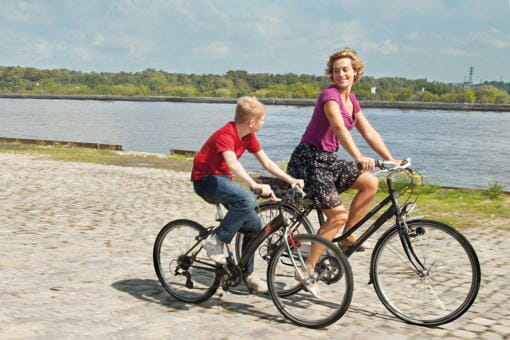By Ryan Mason · March 22, 2012

Veteran filmmakers Jean-Pierre and Luc Dardenne’s The Kid With A Bike defies its generic title by offering an emotionally gripping look at the life of a troubled orphan growing up in Belgium.
It grabs you from the opening frame, as this 11-year-old boy named Cyril fights with his counselor over attempting to call his father, whose phone number has been disconnected. The counselor tries to explain to him that his father had moved and that he has to just accept that. But, Cyril won’t. Instead, he acts out violently to all authority figures – usually biting – as he simply will not believe anyone that his father had left without dropping off his most prized possession: his bike. And thus sets in motion Cyril’s quest to get his bike back, during which he comes face to face with a father who no longer wants him, a local teenager who only wants to use him, and a hairdresser who may just be the one person who won’t abandon him when the going gets tough.
And with Cyril, everything tends to get tough. The Kid With A Bike is anchored by sensational performances by Cecile de France and Thomas Doret, in his big-screen debut as the titular kid with a bike. Simply put: Doret is mesmerizing, to the point where there are moments in the film that I believed I was watching a documentary. He’s utterly convincing in his nuanced performance, capturing those tragic glances of wounded eyes masking terror with anger as he bounces from disappointment to disappointment. The Dardenne Brothers – who wrote and directed the film – guide him perfectly, giving him such a richly drawn character from which to work. Doret’s Cyril is a hellion, an archetypical problem child that, if you saw him acting out on the street, you’d thank your lucky stars that he wasn’t yours. You’d probably even judge his parents for not doing a better job raising him. You’d probably not give him a second thought aside from the irritation that you felt at his outburst, nothing more. Yet, from our perspective, seeing what makes Cyril tick, watching him get let down again and again by those who should be there the most, we understand why he is the way he is. We sympathize for his plight. Even when Cyril clearly makes the wrong decisions – even criminal choices – we want to root for him, defend him, even perhaps make excuses for his behavior. Because we’ve seen what he’s been through while others haven’t. They just see him for his deeds.
Luckily, we’re not the only ones who see him this way. De France’s Samantha recognizes Cyril as the cornered animal he is, in dire need of love and understanding. Of course, it’s not an easy road for either of them. And as Samantha experiences just how low the lows get with Cyril, our worry gets worse and worse that she might not be able to handle him, just like the rest. When will she reach her inevitable breaking point that everyone else before her had hit? When will she give up on him just like his father and his never-seen, never-talked-about mother? When will Samantha stop seeing Cyril as a difficult yet loveable child and only view him as simply a constant headache? It’s incredible just how palpable that tension gets under the expert direction of the Dardennes and the talent of these two incredible actors, to the point where the smallest of actions become so heightened and nerve-wracking. It shows that, in cinema, if you have finely drawn characters and a clearly defined conflict, you don’t need much else. And The Kid With A Bike has them all in spades.